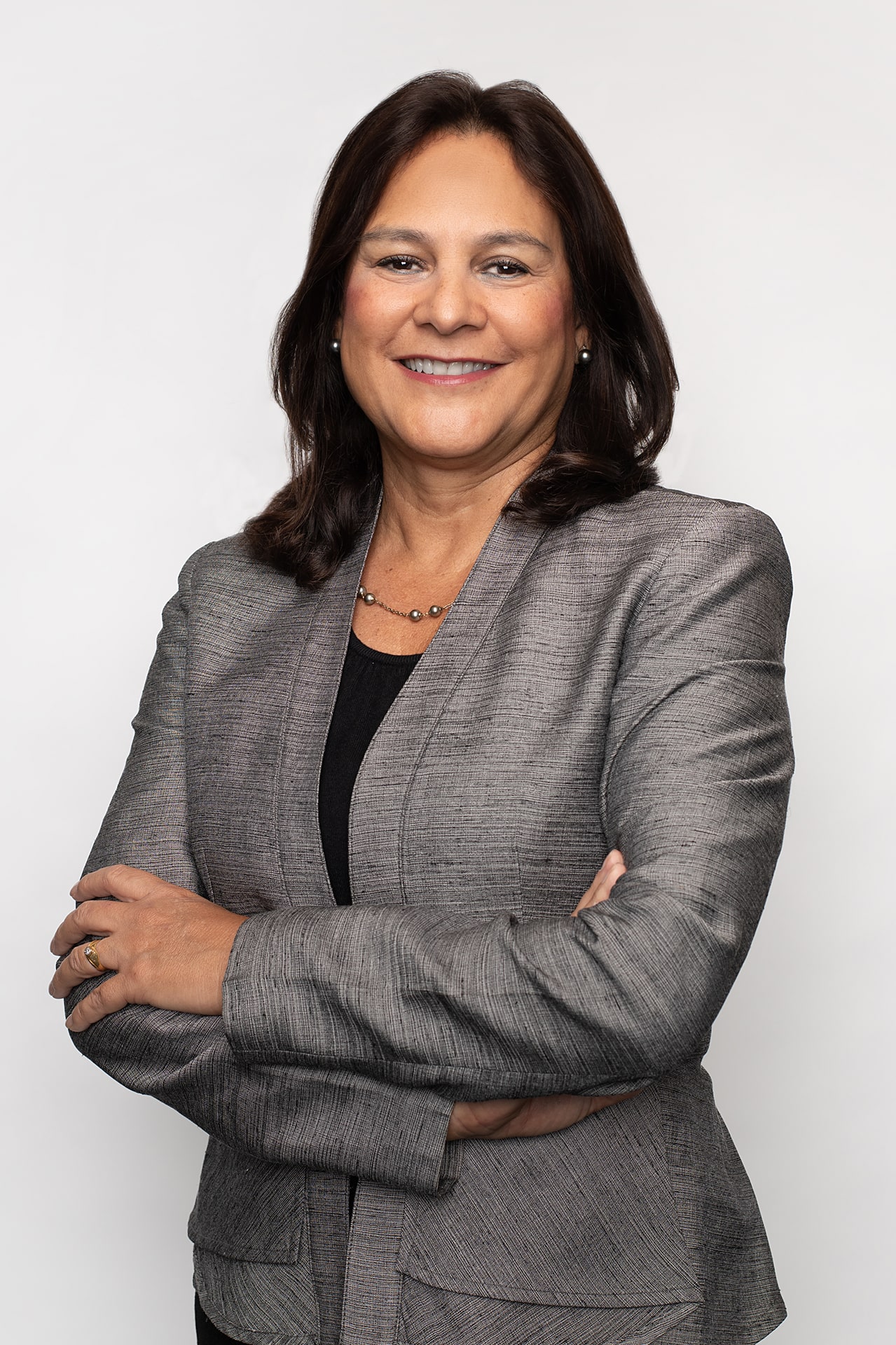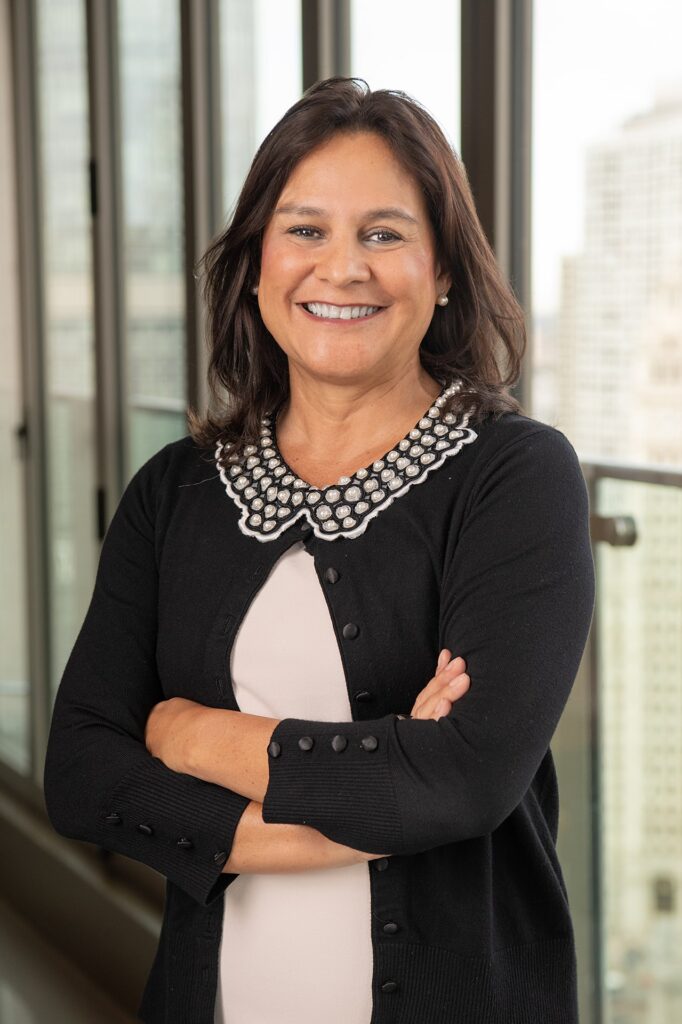
Ilya Espino de Marotta
Deputy Administrator and Chief Operations Officer, Panama Canal Authority
When it was time to modernize the 100-year-old canal, Ilya was drafted to help the nation make it happen. Ilya Espino de Marotta grew up wanting to work in and live beside the ocean. She dreamed of being a marine biologist. When her dream of a career in marine biology was dimmed by the reality of job prospects in her native land of Panama, Ilya reset the sails, charted a new course, and continued seaward.
Ilya is a marine engineer and Deputy Administrator and Chief Operations Officer of the Panama Canal Authority. On the Canal, she helps oversee nearly 50 miles of some of the most strategic real estate in the world—the waterway through which some 13,000 to 14,000 ships pass each year on their way to markets around the world. For her role in leading a nine-year canal expansion project that doubled canal capacity, Forbes Centroamérica put Ilya on its cover and named her one of Central America’s 50 most influential women.
The initial idea of digging a canal through the narrow belt of land connecting North and South America dates to the early 1500s, when King Charles I of Spain commissioned study of a route along the turbulent Chagres River. But actual building of the canal didn’t start for another 300 years, and then took another 34 arduous years to complete. When the canal finally opened in August 1914, it was the most complex engineering project ever undertaken, and had broken countless machines, reputations, bank accounts, and men in the process.
Ilya grew up in Panama with her father, mother, and younger brother. Her parents wanted their children to explore life, so Ilya dabbled in photography, theatre, music, art, tennis, and ballet. What eventually captured her imagination, though, was the work of oceanographer Jacques Cousteau. Intrigued by him, Ilya began scuba diving at age 16. And, when it was time to go to college, she applied for and won a Fulbright Scholarship so she could study marine biology in America.
Partway through college, Ilya came home to Panama to investigate the career options for a marine biologist. The only places needing someone like that, she was told, were rural shrimp farms. Sobered, Ilya switched her major to oceanography and transferred to Texas A&M. One semester in, she met with the lone oceanographer living in Panama, and heard that the only career path in oceanography in Panama was teaching at a university. Once more Ilya switched majors, this time to marine engineering. She was one of only two women in the program at Texas A&M. Still, “I never felt discriminated against,” she recalls. “Both of us were the more studious academics; our male counterparts were the more hands-on, mechanical types. As such, we complemented and helped each other to successfully pass the classes.”
Back in Panama after graduation, Ilya found work on the Panama Canal as an engineer. The canal needs constant maintenance to stay in operation, provided by a flotilla of tugboats, dredging equipment, floating cranes, and more. That flotilla also needs constant maintenance. Ilya’s job was to help design and execute repairs for equipment that limped into the shipyard.
From that beginning, she moved into the dredging division. One day, Ilya’s boss asked her to go out on a specific dredging vessel and take a series of measurements. Ilya did as she was told but wondered why; the measurements seemed ridiculous. That night, the ship’s captain asked her out to dinner. He was, in fact, a good friend of Ilya’s boss and had wanted to meet her. They were married two years later.
More jobs followed, first in the canal’s main engineering office and then as a valuation engineer. After Ilya earned a master’s degree in Economic Engineering, she took a post in the Canal Accounting Division. Then she moved to the Department of Maritime Operations and became the capital investment program coordinator.

“I felt at ease in the shipyard, surrounded by men, because that was my world,” says Ilya. “I was always promoted by a man and I always replaced a man. I didn’t feel discrimination. At the professional level, I assumed your work speaks for you: Are you accountable? Are you responsible? Do you cooperate?”
Then, in 2002, she received the call that changed her life. A four-person team was forming to draft a master plan for expanding the Canal. Did she want to be part of the team? “Of course!” she answered.
The problem facing the Canal for the team to resolve was burgeoning international trade. That meant larger ships were moving larger cargos around the world. But the aging canal was built to specs from 1914. Rather than widen the existing locks, the task force instead recommended installing a whole new channel and set of locks that would run parallel to the original structure. These new locks could accommodate the massive NeoPanamax ships carrying three times as much cargo as the ships currently plying the canal. The project would also include widening and deepening the existing channels.
Through a national referendum, Panama’s citizens approved the $5 billion proposed expansion by a landslide in 2006. When construction crews broke ground in 2007, Ilya—who’d never supervised more than one or two people in any job up to that point—suddenly found herself leading a team of 100, with oversight for environmental protection, documentation, legal issues, safety, project controls, budget, and more. Learning as she went, she helped move the expansion forward for three years.
Then the bottom fell out of Ilya’s world. In 2010, her 17-year-old son was diagnosed with osteosarcoma, an aggressive form of bone cancer. “It’s malignant,” the doctors told her. “You have no time to lose.”
In the middle of the biggest project of her life, Ilya had to walk into her boss’s office and say, “I need to take a leave of absence.” For treatment, Ilya and her son moved to New York while the rest of the family stayed in Panama. Ilya’s husband flew in each month so Ilya could go back to Panama and work on the expansion project for a month. Then the second blow fell: Ilya’s husband was also diagnosed with cancer. He moved to New York as well for his care. Ilya’s mother began rotating in and out so that Ilya could keep coming back to Panama for a week each month.
Incredibly, it all worked. Ilya’s son and husband recovered, the expansion project moved forward, and Ilya kept her hand in throughout. “My team was fantastic,” she says. To make sure Ilya and her family never missed a paycheck, fellow employees on the canal donated 1,300 hours of their own vacation time to cover their leave.
“That year gave me a new perspective on people,” says Ilya. “Normally, I’m a very reserved person. But that experience made me more empathetic, more understanding, and that gave me a better grasp on leadership.”
Shortly after Ilya returned to Panama for good in September 2011, her boss was promoted. The person he suggested should run the canal expansion project in his place was Ilya.
“That was the first time I felt discriminated against,” she says. “That’s when I finally became aware of inequality—very late in my career.” The Canal Authority board of directors questioned putting a woman in charge of the project when men were available. Ilya also discovered she wasn’t being paid the same amount as other vice presidents who oversaw less significant parts of the operation. “I went to my boss and said, ‘Hey, what is this?’ The answer was that I was on some kind of probation for a year.”
Still, Ilya won the job of leading the Canal Expansion. In February 2012, she became Executive Vice President for Engineering—the first woman in the history of the Panama Canal Authority to hold the role. To make a point, she started wearing a pink hardhat and safety vest on the job. “I just wanted to make a statement: I’m a woman and I can do this,” she says.
She didn’t expect anyone to particularly notice the pink hardhat; it was her own thing. Instead, images of Ilya wearing it went viral. Suddenly, the reserved, private, serious engineer was becoming famous. The Panamanian Association of Business Executives handed her their “Outstanding Woman of the Year” award in 2014. She gave a TED talk. AWESOME (Achieving Women’s Excellence in Supply Chain Operations, Management, and Education) presented Ilya with an Awesome Legendary Leadership (ALL) Award in 2018 to recognize her professional excellence and success. Girls at university saw her pink hardhat and told Ilya, “Because of you, we’re going for it.” Forbes put her on their cover.
In 2016, the Canal Expansion project finally finished. Wearing her pink hardhat, Ilya stood on a platform and, while the cameras rolled, helped open the sluices that sent water pouring into the giant new locks. She had brought the oceans of east and west to her.
“You know, at the time, I was the only woman on the Panama Canal Authority senior executive team,” says Ilya. “There were 11 men. They had certain ways of addressing an issue. I often had a different one. Men and women think differently, and I think that’s very important. The beauty is precisely that we are not the same. That’s why I think you need to have both genders represented for better decision-making, for more win-win.”
Today, Ilya makes a point of mentoring girls and women who are interested in STEM careers. She often speaks to high school-age girls. “I tell them, you’re always a leader to somebody. And I tell them not to be afraid,” says Ilya. “Don’t let anybody tell you ‘No.’ Look at my life! If you really want to do it, you can achieve it.”